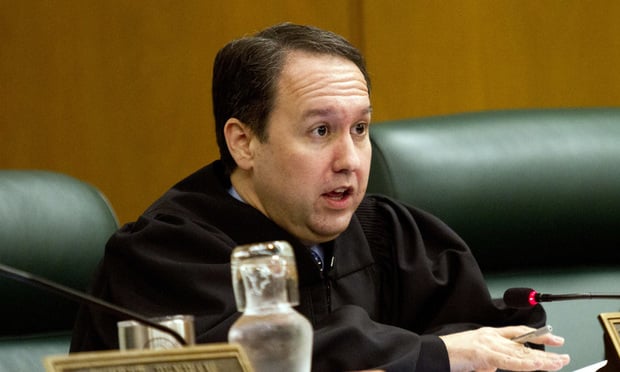'Showcase' Civility, Justice Blackwell Tells New Lawyers, Hearkens Back to 2017 Hines Address
“We seem to have lost the capacity to disagree without being disagreeable,” Justice Keith Blackwell said. “We as a profession have an opportunity to showcase for society how to disagree in a civil tone.”
November 08, 2018 at 12:50 PM
4 minute read
 Justice Keith Blackwell, Supreme Court of Georgia (Photo: John Disney/ALM)
Justice Keith Blackwell, Supreme Court of Georgia (Photo: John Disney/ALM)
As bitter partisan bickering came to a crescendo with the midterm elections this week, brand new lawyers sworn in at the Georgia Supreme Court were presented with a challenge along with their “certificates suitable for framing.”
“We seem to have lost the capacity to disagree without being disagreeable,” Justice Keith Blackwell told the latest entries admitted to the practice of law there. The adversarial nature of their job, always advocating for clients on opposite sides of a dispute, provides a vehicle to lead the way toward the light, he told them.
“We as a profession have an opportunity to showcase for society how to disagree in a civil tone,” Blackwell said. “That requires that we humanize those with whom we disagree.”
Lawyers need to take seriously their role as guides to justice for all, Blackwell said.
“You are the most frequent point of contact that most citizens will have with the legal system,” Blackwell said. “You are—what our dear friend Harris Hines used to say—the indispensable men and women when it comes to maintaining the integrity of the system.”
Blackwell was drawing inspiration from recently retired Chief Justice P. Harris Hines, who was killed in a car crash Sunday. Moments earlier, the court had opened its Monday morning session with a somber tribute and a moment of silence for Hines, remembered most movingly for his kindness.
The high court has a long tradition of passing on words of wisdom, or at least encouragement, to new lawyers, along with the papers that Hines smilingly called “certificates suitable for framing.” Court-watchers say they can tell who is going to write the first opinion of the day based on who takes point on the talk, although that precedent doesn't always apply.
Hines gave the talk when the high court held oral arguments at the University of Georgia School of Law in Athens a year ago, but he didn't write either of the two opinions that came from that session six months later. He did use the “indispensable” speech, though.
After that group investiture in the fall of 2017, the chief started a history lesson on James Madison 230 years ago planning the Constitutional Convention. Hines said Madison in eight words persuaded George Washington, 43 and battle-weary, to attend: “General, you must. You are the indispensable man.”
Hines told the newbies at the time, “As lawyers, you are the indispensable people.”
Then he sprinkled them with a shower of quotations. He started with his son, Hap Hines, kicker for the University of Georgia Bulldogs football team from 1996 to 1999. “You will experience a lot of excitement and moments of terror when your son is kicking in front of 100,000 people,” the elder Hines said last year. When asked by his father if he ever felt fear, the son said: “Dad, you just play through it.” Do that, the chief justice advised them.
Hines suggested emulating Justice David Nahmias' “pay it forward” motto. He said the song Frank Sinatra made famous, “My Way,” with the “I did it my way” chorus, represents a “truly a horrible philosophy,” prompting a big laugh from the crowd. No one can do it alone, Hines added at the time.
Hines also cited Justice Harold Melton, urging, “Bloom where you are planted.”
And he quoted Robin Frazer Clark, former president of the State Bar of Georgia and the Georgia Trial Lawyers Association, saying: “Look at everything through the eyes of kindness.” Be like her, Hines advised in last year's address.
Then he sent the audience off to pick up their “certificates suitable for framing” with this blessing: “I wish you health and happiness.”
No doubt Hines would concur with Blackwell's call for kinder tone.
This content has been archived. It is available through our partners, LexisNexis® and Bloomberg Law.
To view this content, please continue to their sites.
Not a Lexis Subscriber?
Subscribe Now
Not a Bloomberg Law Subscriber?
Subscribe Now
NOT FOR REPRINT
© 2025 ALM Global, LLC, All Rights Reserved. Request academic re-use from www.copyright.com. All other uses, submit a request to [email protected]. For more information visit Asset & Logo Licensing.
You Might Like
View All
Law Firms Expand Scope of Immigration Expertise Amid Blitz of Trump Orders
6 minute read
Bass Berry & Sims Relocates to Nashville Office Designed to Encourage Collaboration, Inclusion
4 minute read
Gunderson Dettmer Opens Atlanta Office With 3 Partners From Morris Manning
3 minute read
Trending Stories
- 1Uber Files RICO Suit Against Plaintiff-Side Firms Alleging Fraudulent Injury Claims
- 2The Law Firm Disrupted: Scrutinizing the Elephant More Than the Mouse
- 3Inherent Diminished Value Damages Unavailable to 3rd-Party Claimants, Court Says
- 4Pa. Defense Firm Sued by Client Over Ex-Eagles Player's $43.5M Med Mal Win
- 5Losses Mount at Morris Manning, but Departing Ex-Chair Stays Bullish About His Old Firm's Future
Who Got The Work
J. Brugh Lower of Gibbons has entered an appearance for industrial equipment supplier Devco Corporation in a pending trademark infringement lawsuit. The suit, accusing the defendant of selling knock-off Graco products, was filed Dec. 18 in New Jersey District Court by Rivkin Radler on behalf of Graco Inc. and Graco Minnesota. The case, assigned to U.S. District Judge Zahid N. Quraishi, is 3:24-cv-11294, Graco Inc. et al v. Devco Corporation.
Who Got The Work
Rebecca Maller-Stein and Kent A. Yalowitz of Arnold & Porter Kaye Scholer have entered their appearances for Hanaco Venture Capital and its executives, Lior Prosor and David Frankel, in a pending securities lawsuit. The action, filed on Dec. 24 in New York Southern District Court by Zell, Aron & Co. on behalf of Goldeneye Advisors, accuses the defendants of negligently and fraudulently managing the plaintiff's $1 million investment. The case, assigned to U.S. District Judge Vernon S. Broderick, is 1:24-cv-09918, Goldeneye Advisors, LLC v. Hanaco Venture Capital, Ltd. et al.
Who Got The Work
Attorneys from A&O Shearman has stepped in as defense counsel for Toronto-Dominion Bank and other defendants in a pending securities class action. The suit, filed Dec. 11 in New York Southern District Court by Bleichmar Fonti & Auld, accuses the defendants of concealing the bank's 'pervasive' deficiencies in regards to its compliance with the Bank Secrecy Act and the quality of its anti-money laundering controls. The case, assigned to U.S. District Judge Arun Subramanian, is 1:24-cv-09445, Gonzalez v. The Toronto-Dominion Bank et al.
Who Got The Work
Crown Castle International, a Pennsylvania company providing shared communications infrastructure, has turned to Luke D. Wolf of Gordon Rees Scully Mansukhani to fend off a pending breach-of-contract lawsuit. The court action, filed Nov. 25 in Michigan Eastern District Court by Hooper Hathaway PC on behalf of The Town Residences LLC, accuses Crown Castle of failing to transfer approximately $30,000 in utility payments from T-Mobile in breach of a roof-top lease and assignment agreement. The case, assigned to U.S. District Judge Susan K. Declercq, is 2:24-cv-13131, The Town Residences LLC v. T-Mobile US, Inc. et al.
Who Got The Work
Wilfred P. Coronato and Daniel M. Schwartz of McCarter & English have stepped in as defense counsel to Electrolux Home Products Inc. in a pending product liability lawsuit. The court action, filed Nov. 26 in New York Eastern District Court by Poulos Lopiccolo PC and Nagel Rice LLP on behalf of David Stern, alleges that the defendant's refrigerators’ drawers and shelving repeatedly break and fall apart within months after purchase. The case, assigned to U.S. District Judge Joan M. Azrack, is 2:24-cv-08204, Stern v. Electrolux Home Products, Inc.
Featured Firms
Law Offices of Gary Martin Hays & Associates, P.C.
(470) 294-1674
Law Offices of Mark E. Salomone
(857) 444-6468
Smith & Hassler
(713) 739-1250






